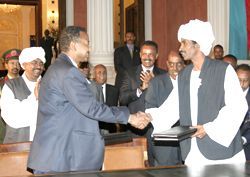East Sudan ex-rebels vow peaceful future
Nov 26, 2006 (KHARTOUM) — Former rebels from eastern Sudan on Sunday vowed to lay down their arms and pursue the path of politics as they held their first ever news conference in Khartoum after signing a peace deal last month.
 “We have decided to return home, stop fighting against the government and begin operating as a political party,” said Abdullah Musa, spokesman for the Eastern Front rebel grouping.
“We have decided to return home, stop fighting against the government and begin operating as a political party,” said Abdullah Musa, spokesman for the Eastern Front rebel grouping.
The rebels, like their better known counterparts in Sudan’s western region of Darfur, took up arms 12 years ago in protest at what they said was the marginalisation of their mineral-rich region by the Khartoum government.
The Front is composed of two factions — the larger Beja Congress drawn from members of the African Beja tribe and the Rashidiya, a tribe originally from the Arabian peninsula.
“We have completed preparations for implementing the peace agreement that we signed with the national unity government in Asmara on October 14,” said Musa, hailing Eritrea’s “honest and impartial” role in brokering the deal.
“Our political organisation is ready for participation in politics and our military leadership is also ready to move to three points of assembly inside east Sudan as specified by the peace agreement,” Musa added, speaking from the Front’s new offices in the Sudanese capital.
According to power-sharing provisions in the peace deal, a presidential assistant will be nominated from among the leaders of the Eastern Front, who Mussa on Sunday named as Eastern Front chief Musa Mohamed Ahmed.
A minister of state and eight members of parliament will also be chosen from among the rebel group, posts for which Musa said the Front was still seeking nominations.
On resource sharing, the Sudanese government will allocate 100 million dollars to development of the eastern region in 2007, followed by 125 million dollars a year between 2008 and 2011 — a total of 600 million dollars over five years.
Under security arrangements agreed in the peace deal, all Eastern Front prisoners will be released after the ceasefire and its fighters will be integrated into the Sudanese army.
Musa said armed eastern rebels number around 1,800 who, once assembled, will decide on whether to return to civilian life or join the Sudanese army or police.
He also alleged that “hidden hands” had tried to turn Sudan’s eastern conflict into “another Darfur”, where hundreds of thousands of people have died in fighting between rebels, the army and government-backed militia.
“The hidden hands planned to make of east Sudan another Darfur where Arab and non-Arab tribes are fighting against each other, but the east is not a soil for tribal conflict,” he said.
(AFP)
